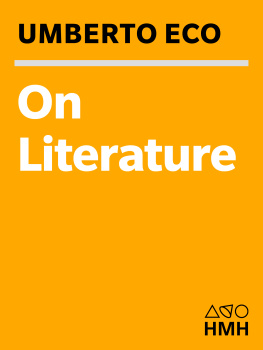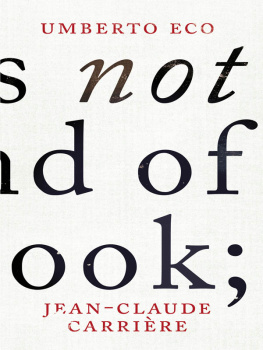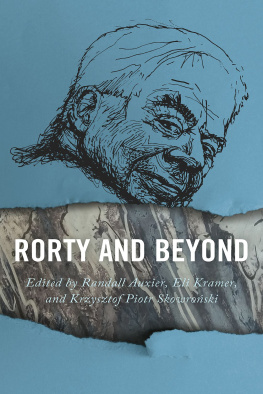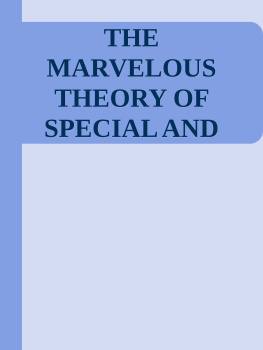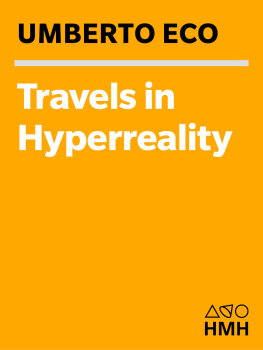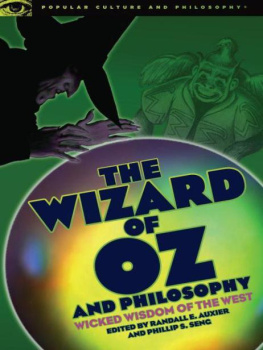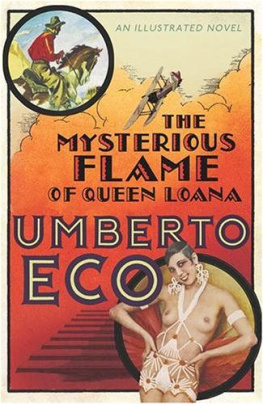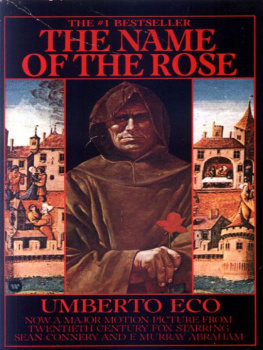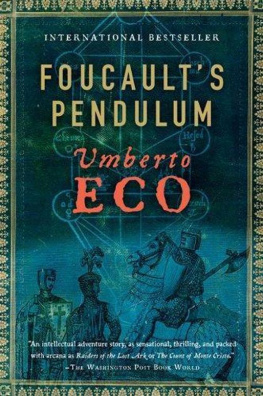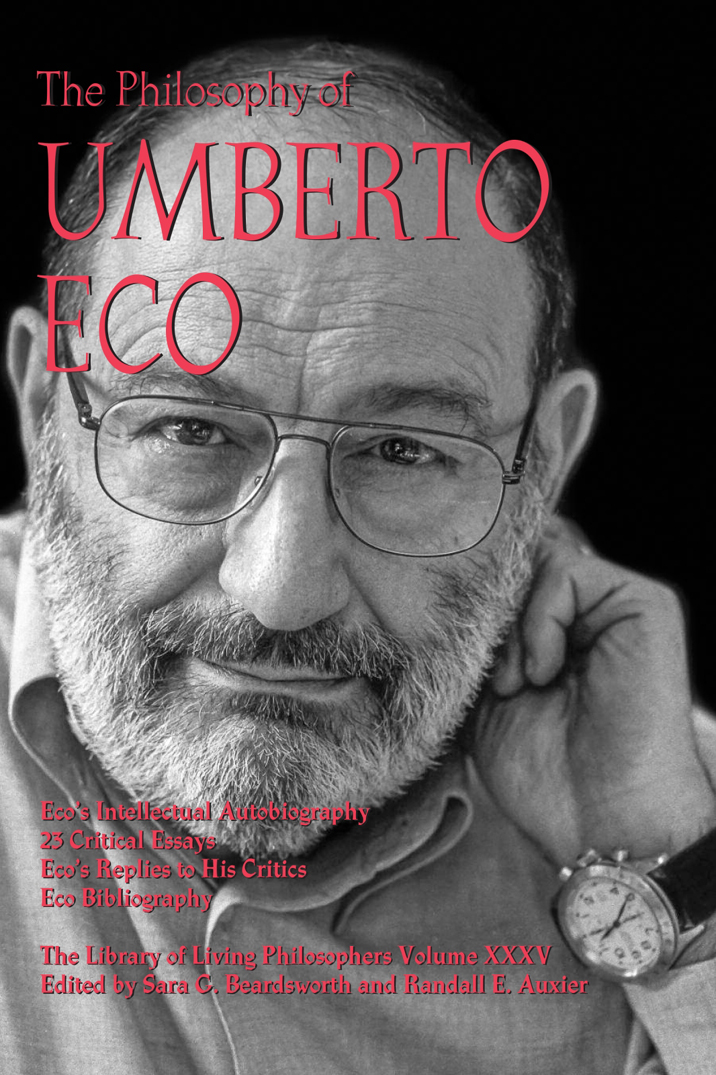
THE LIBRARY OF LIVING PHILOSOPHERS
PAUL ARTHUR SCHILPP, FOUNDER AND EDITOR 19391981
LEWIS EDWIN HAHN, EDITOR 19812001
RANDALL E. AUXIER, EDITOR 20012013
DOUGLAS R. ANDERSON, EDITOR 20132015
SARA G. BEARDSWORTH, EDITOR 2015present
Paul Arthur Schilpp, Editor
THE PHILOSOPHY OF JOHN DEWEY (1939, 1971, 1989)
THE PHILOSOPHY OF GEORGE SANTAYANA (1940, 1951)
THE PHILOSOPHY OF ALFRED NORTH WHITEHEAD (1941, 1951)
THE PHILOSOPHY OF G. E. MOORE (1942, 1971)
THE PHILOSOPHY OF BERTRAND RUSSELL (1944, 1971)
THE PHILOSOPHY OF ERNST CASSIRER (1949)
ALBERT EINSTEIN: PHILOSOPHER-SCIENTIST (1949, 1970)
THE PHILOSOPHY OF SARVEPALLI RADHAKRISHNAN (1952)
THE PHILOSOPHY OF KARL JASPERS (1957; AUG. ED., 1981)
THE PHILOSOPHY OF C. D. BROAD (1959)
THE PHILOSOPHY OF RUDOLF CARNAP (1963)
THE PHILOSOPHY OF C. I. LEWIS (1968)
THE PHILOSOPHY OF KARL POPPER (1974)
THE PHILOSOPHY OF BRAND BLANSHARD (1980)
THE PHILOSOPHY OF JEAN-PAUL SARTRE (1981)
Paul Arthur Schilpp and Maurice Friedman, Editors
THE PHILOSOPHY OF MARTIN BUBER (1967)
Paul Arthur Schilpp and Lewis Edwin Hahn, Editors
THE PHILOSOPHY OF GABRIEL MARCEL (1984)
THE PHILOSOPHY OF W. V. QUINE (1986, AUG. ED., 1998)
THE PHILOSOPHY OF GEORG HENRIK VON WRIGHT (1989)
Lewis Edwin Hahn, Editor
THE PHILOSOPHY OF CHARLES HARTSHORNE (1991)
THE PHILOSOPHY OF A. J. AYER (1992)
THE PHILOSOPHY OF PAUL RICOEUR (1995)
THE PHILOSOPHY OF PAUL WEISS (1995)
THE PHILOSOPHY OF HANS-GEORG GADAMER (1997)
THE PHILOSOPHY OF RODERICK M. CHISHOLM (1997)
THE PHILOSOPHY OF P. F. STRAWSON (1998)
THE PHILOSOPHY OF DONALD DAVIDSON (1999)
Lewis Edwin Hahn, Randall E. Auxier, and Lucian W. Stone, Jr., Editors
THE PHILOSOPHY OF SEYYED HOSSEIN NASR (2001)
Randall E. Auxier and Lewis Edwin Hahn, Editors
THE PHILOSOPHY OF MARJORIE GRENE (2002)
THE PHILOSOPHY OF JAAKKO HINTIKKA (2006)
THE PHILOSOPHY OF MICHAEL DUMMETT (2007)
THE PHILOSOPHY OF RICHARD RORTY (2010)
THE PHILOSOPHY OF ARTHUR C. DANTO (2013)
Randall E. Auxier, Douglas R. Anderson, and Lewis Edwin Hahn, Editors
THE PHILOSOPHY OF HILARY PUTNAM (2015)
Sara G. Beardsworth and Randall E. Auxier, Editors
THE PHILOSOPHY OF UMBERTO ECO (2017)
In Preparation:
THE PHILOSOPHY OF JULIA KRISTEVA
THE PHILOSOPHY OF MARTHA NUSSBAUM


To find out more about Open Court books, call 1-800-815-2280, or visit our website at www.opencourtbooks.com.
Cover photo Galligani/Contrasto
Frontispiece photo Harari/Contrasto
THE PHILOSOPHY OF UMBERTO ECO
Open Court Publishing Company is a division of Carus Publishing Company, dba Cricket Media.
Copyright 2017 by The Library of Living Philosophers
First printing 2017
All rights reserved. No part of this publication may be reproduced, stored in a retrieval system, or transmitted, in any form or by any means, electronic, mechanical, photocopying, recording, or otherwise, without the prior written permission of the publisher, Open Court Publishing Company, a division of Cricket Media, 70 East Lake Street, Suite 800, Chicago, Illinois 60601.
Library of Congress Cataloging-in-Publication Data
Names: Beardsworth, Sara editor. | Auxier, Randall E., 1961 editor.
Title: The philosophy of Umberto Eco / edited by Sara G. Beardsworth and Randall E. Auxier.
Description: Chicago: Open Court, 2017. | Series: The library of living philosophers; volume XXXV | Includes bibliographical references and index. | Bibliography of the writings of Umberto Eco: pages
Identifiers: LCCN 2016035149 (print) | LCCN 2016051888 (ebook) | ISBN 9780812699654 (e-book)
Subjects: LCSH: Eco, UmbertoCriticism and interpretation. | Semiotics. | Language and languagesPhilosophy.
Classification: LCC PQ4865.C6 Z815 2017 (print) | LCC PQ4865.C6 (ebook) | DDC 853/.914dc23
LC record available at https://lccn.loc.gov/2016035149
The Library of Living Philosophers is published under the sponsorship of Southern Illinois University Carbondale.
Why Philosophy? by Umberto Eco is a translation of Perch la filosofia? in Storia della filosofia (Milan: EM Publishers, 2013).
Figures 1 and 2 in Umberto Eco, Intellectual Autobiography were first published in Semiotics and the Philosophy of Language (Bloomington: Indiana University Press, 1984).
Figure 1 in Modes of Sign Production by Andrea Valle was first published as Table 39 in Umberto Eco, A Theory of Semiotics (Bloomington: Indiana University Press, 1976).
Several passages of Ecos Narratology by Lubomr Doleel were first published in his The Themata of Ecos Semiotics of Literature, in Reading Eco: An Anthology (Bloomington: Indiana University Press, 1997).
Figure 1 National Congress Building Brasilia in Of Bowls, Magnetized Marbles, and Umberto Eco by Charles Jencks is reproduced courtesy of Satoshi Isono, Architectural Association, London.
Figure 1 in Cultural Studies, Ideology, and Media Texts by Lucrecia Escudero Chauvel is reproduced courtesy of Le Monde.
Since its founding in 1938 by Paul Arthur Schilpp, the Library of Living Philosophers has been devoted to critical analysis and discussion of some of the worlds greatest living philosophers. The format for the series provides for creating in each volume a dialogue between the critics and the great philosopher. The aim is not refutation or confrontation but rather fruitful joining of issues and improved understanding of the positions and issues involved. That is, the goal is not overcoming those who differ from us philosophically but interacting creatively with them.
The basic idea for the series, according to Professor Schilpps general introduction to the earlier volumes, came from the late F. C. S. Schillers essay Must Philosophers Disagree? While Schiller may have been overly optimistic about ending interminable controversies in this way, it seems clear that directing searching questions to great philosophers about what they really mean or how they might resolve or address difficulties in their philosophies can produce far greater clarity of understanding and more fruitful philosophizing than would otherwise exist.
To Paul Arthur Schilpps undying credit, he acted on this basic thought in launching the Library of Living Philosophers. The general plan for the volumes has sometimes been altered to fit circumstances, but in ways that have well served the mission of the series. The intellectual autobiographies, or, in a few cases, the biographies, shed a great deal of light on both how the philosophies of the great thinkers developed and the major philosophical movements and issues of their time; and many of our great philosophers seek to orient their outlook not merely to their contemporaries but also to what they find most important in earlier philosophers. The critical perspectives of our distinguished contributors have often stood on their own as landmark studies, widely cited and familiar not only to subsequent specialists, but frequently discussed in their own right as pieces of great philosophy. The bibliography helps to provide ready access to the featured scholars writings and thought.


